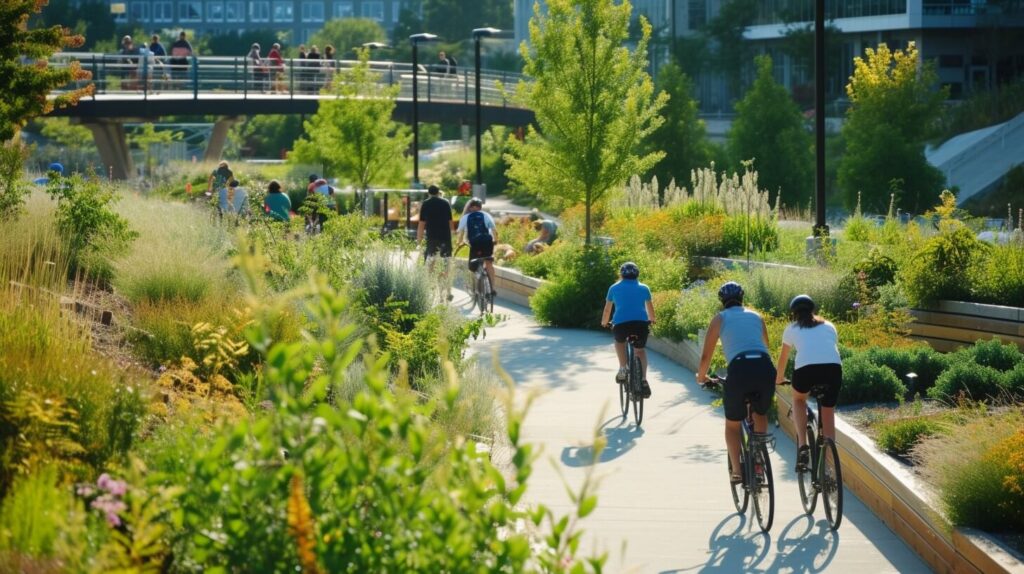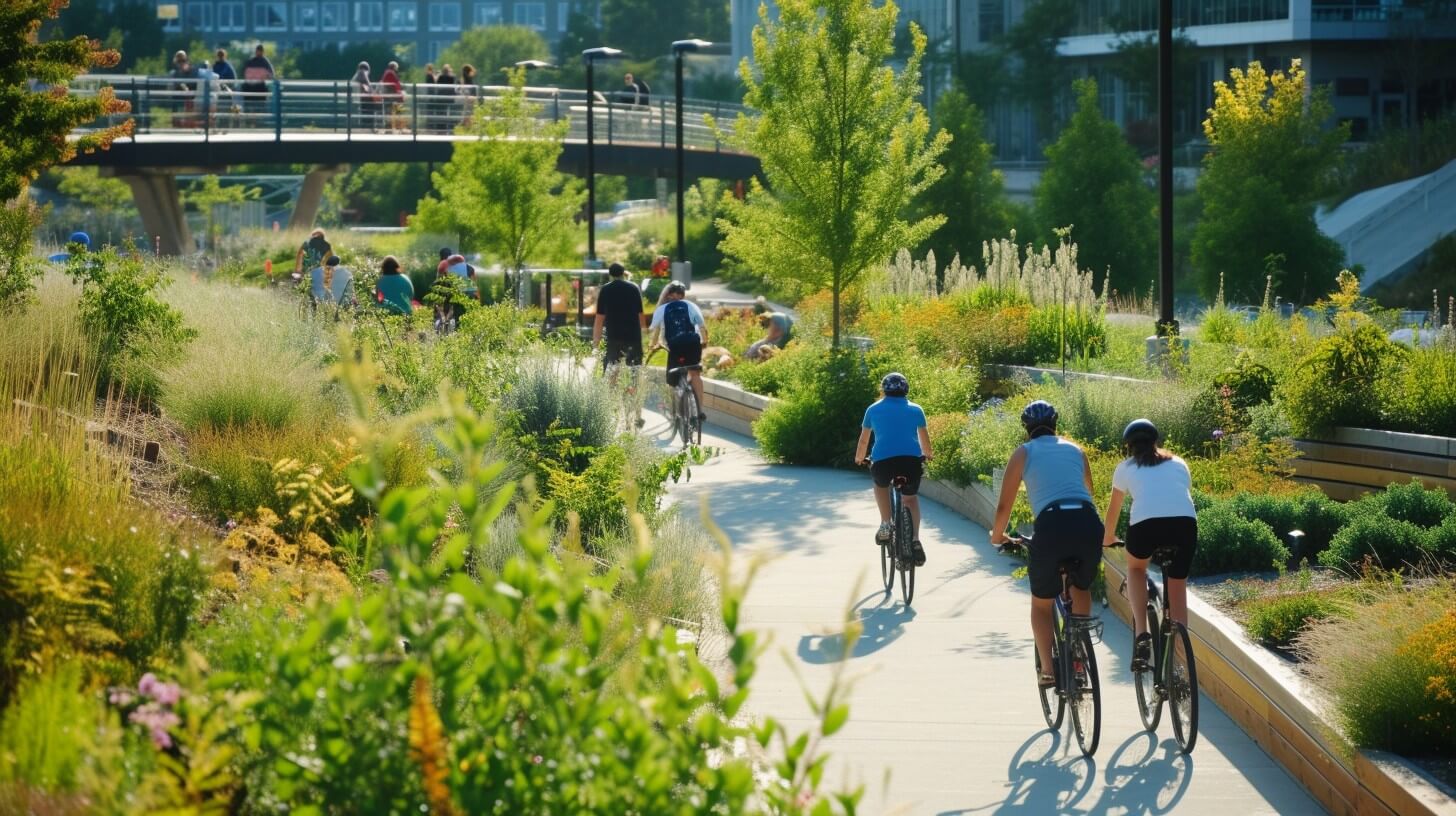Welcome to your comprehensive guide to Sustainable Britain travel living and eco-friendly. As awareness of environmental issues grows, more people are seeking ways to reduce their impact on the planet.
This guide aims to address common questions and concerns about sustainable living and travel, providing practical, relatable advice to help you make greener choices.
Whether you’re planning a holiday or looking to adopt a more eco-friendly lifestyle, this guide is designed to feel like a chat with a knowledgeable friend.

Common Questions and Concerns
- How can I travel more Sustainable Britain travel?
- What are some eco-friendly accommodation options?
- How can I reduce my carbon footprint while traveling?
- What are the best ways to live sustainably at home?
- Are there local businesses and markets that support sustainable living?
- What eco-friendly activities can I do in Britain?
- How can I support local conservation efforts?
Sustainable Travel Tips
Choosing Eco-Friendly Transportation
Travelling sustainably starts with how you get around.
Here are some eco-friendly options:
- Public Transport: Britain’s extensive public transport system, including trains and buses, is an excellent way to reduce your carbon footprint. For example, the National Rail service connects major cities and rural areas, making it easy to travel without a car.
- Cycling and Walking: For shorter distances, consider biking or walking. Cities like London, Cambridge, and Edinburgh have robust bike-sharing schemes and pedestrian-friendly pathways.
- Car Sharing: Use car-sharing services like Zipcar or ride-sharing apps to cut down on individual car use. This not only reduces emissions but also eases traffic congestion.
Eco-Friendly Accommodation
When choosing where to stay, look for accommodations that prioritise sustainability.
Here are a few tips:
- Eco-Lodges and Green Hotels: These establishments follow sustainable practices like energy efficiency, water conservation, and waste reduction. Websites like EcoHotels.com can help you find certified eco-friendly lodgings.
- Local Bed & Breakfasts: Support local economies by staying in smaller, locally-owned accommodations that often have lower environmental impacts. Many B&Bs in Britain source food locally and use eco-friendly products.
- Camping: If you love nature, consider camping in designated areas. Just be sure to follow Leave No Trace principles. The National Trust and Forestry England offer excellent camping spots with minimal environmental impact.
Reducing Your Travel Carbon Footprint
Even while on the go, there are ways to minimise your impact:
- Pack Light: Lighter luggage means less fuel consumption for transportation. Aim to pack only essentials and choose versatile clothing.
- Reusable Items: Bring a reusable water bottle, shopping bags, and utensils to avoid single-use plastics. Many cities in Britain have water refill stations to make staying hydrated eco-friendly.
- Local Dining: Eat at local restaurants that source their ingredients sustainably. This supports local farmers and reduces the carbon footprint associated with food transportation.
Eco-Friendly Travel Destinations in Britain
The Lake District
The Lake District is not only one of Britain’s most beautiful regions but also a leader in Sustainable Britain travel
With numerous walking and cycling trails, you can explore this stunning landscape without relying on cars.
Many local businesses are committed to sustainability, offering locally-sourced food and eco-friendly accommodations.
The Cotswolds
Known for its charming villages and rolling hills, the Cotswolds is a great destination for eco-friendly travellers.
The area has numerous walking paths and cycling routes. Additionally, many local markets and shops sell sustainable products and produce.
Cornwall
Cornwall is famous for its stunning coastline and vibrant local culture. Support sustainability by staying in eco-friendly accommodations and enjoying local, sustainably caught seafood. The Eden Project, a popular attraction, is dedicated to environmental education and conservation.
Scottish Highlands
The Scottish Highlands offer breathtaking landscapes and a variety of eco-friendly activities. Consider staying in eco-lodges or bothies, which are traditional Scottish huts that minimize environmental impact.
Engage in outdoor activities like hiking and wildlife watching to appreciate the natural beauty without leaving a footprint.
Sustainable Living at Home
Energy Efficiency
Making your home more energy-efficient is a significant step toward sustainability:
- LED Lighting: Replace old bulbs with energy-efficient LED lights. LEDs use up to 80% less energy and last much longer than traditional incandescent bulbs.
- Smart Thermostats: Use programmable thermostats to reduce energy use. These devices can learn your schedule and adjust heating and cooling to save energy when you’re not home.
- Insulation: Properly insulate your home to maintain temperature without overusing heating or cooling systems. Consider eco-friendly insulation materials like sheep’s wool or recycled denim.
Waste Reduction
Reducing waste is crucial for a Sustainable Britain travel lifestyle:
- Recycling: Make sure to recycle paper, glass, and plastics correctly. Familiarise yourself with your local council’s recycling guidelines to ensure you’re sorting your waste properly.
- Composting: Compost organic waste to reduce landfill contributions and create nutrient-rich soil for gardening. A compost bin in your garden or an indoor composting system can significantly reduce household waste.
- Reusable Products: Opt for reusable items like cloth bags, stainless steel straws, and glass containers. Avoid single-use plastics whenever possible and choose products with minimal packaging.
Water Conservation
Conserving water is essential for sustainability:
- Low-Flow Fixtures: Install low-flow showerheads and faucets to reduce water usage. These fixtures can significantly cut down on water consumption without compromising performance.
- Rainwater Harvesting: Collect rainwater for gardening and other outdoor uses. Simple systems can be set up to capture rainwater from your roof and store it for later use.
- Mindful Usage: Be mindful of your water usage by taking shorter showers, fixing leaks promptly, and using water-efficient appliances.
Supporting Local Businesses
Support businesses that are committed to sustainability:
- Farmers Markets: Buy fresh, locally-produced food. This reduces the carbon footprint associated with food transportation and supports local farmers.
- Eco-Friendly Stores: Shop at stores that offer sustainable and ethically-produced goods. Look for certifications like Fair Trade, Organic, and B Corp.
- Second-Hand Shops: Purchase second-hand items to reduce demand for new products and limit waste. Thrift stores, vintage shops, and online marketplaces like eBay are great places to find unique, pre-loved items.
Eco-Friendly Activities in Britain
Outdoor Activities
Britain offers numerous eco-friendly activities that allow you to enjoy nature while minimizing your environmental impact:
- Hiking: With its vast network of national parks and trails, Britain is a hiker’s paradise. Popular trails include the South West Coast Path, the Pennine Way, and the West Highland Way.
- Wildlife Watching: Observe Britain’s diverse wildlife in their natural habitats. Visit nature reserves and national parks to see species like red deer, puffins, and otters.
- Kayaking and Canoeing: Explore Britain’s waterways with minimal environmental impact. Many areas offer kayak and canoe rentals, allowing you to enjoy rivers, lakes, and coastal waters.
Cultural Experiences
Engaging with local culture in a sustainable way can enhance your travel experience:
- Historical Sites: Visit historical sites that are committed to conservation and sustainability. Many castles, museums, and heritage sites have implemented eco-friendly practices.
- Local Festivals: Participate in local festivals that celebrate regional culture and promote sustainability. Events like the Green Man Festival in Wales focus on environmental awareness and local artistry.
- Artisan Workshops: Take part in workshops led by local artisans who use sustainable materials and traditional techniques. These experiences support local craftspeople and provide a deeper connection to the region’s culture.

Supporting Local Conservation Efforts
Volunteering
Volunteering is a fantastic way to support local conservation efforts and give back to the community:
- Beach Cleanups: Join beach cleanup events to help remove litter and protect marine life. Organisations like Surfers Against Sewage organise regular cleanups along Britain’s coastlines.
- Tree Planting: Participate in tree planting initiatives to combat deforestation and promote biodiversity. The Woodland Trust and Trees for Cities often have volunteer opportunities.
- Wildlife Conservation: Support wildlife conservation projects by volunteering at nature reserves or wildlife rehabilitation centres. The Wildlife Trusts offer various volunteer programs across the country.
Donating
If you’re unable to volunteer your time, consider donating to organisations dedicated to environmental conservation:
- National Trust: Support the National Trust’s efforts to preserve historical sites and natural landscapes through membership or donations.
- Marine Conservation Society: Donate to the Marine Conservation Society to help protect Britain’s marine environment.
- WWF-UK: Support WWF-UK’s initiatives to tackle climate change, protect endangered species, and promote sustainable practices.
Conclusion
Living and traveling sustainably in Britain is entirely possible with a little planning and commitment.
By choosing eco-friendly transportation, accommodations, and activities, you can significantly reduce your environmental impact. Supporting local businesses and conservation efforts further contributes to a greener future.
Remember, every small step counts, and together, we can make a big difference.
Whether you’re an eco-conscious traveler or someone looking to adopt a more sustainable lifestyle at home, this guide provides practical, relatable advice to help you on your journey.
Embrace the challenge, enjoy the process, and feel good knowing you’re contributing to a more sustainable world.
Frequently Asked Questions
What are Britons’ attitudes towards climate change and sustainability?
60% of Britons agree that climate change is the biggest threat to civilization. This sentiment is particularly strong among younger generations, with 70% of Gen Z and 63% of Millennials in agreement. However, the perception of climate change as a critical threat tends to diminish with age, indicating generational differences in environmental concern.
How willing are British consumers to invest in sustainable products?
21% of Britons, identified as “Planet Protectors,” are willing to spend more on sustainable products due to their commitment to environmental health.
This segment shows a strong dedication to investing in eco-friendly options. However, 17% of Britons value sustainability but are heavily influenced by product pricing, suggesting that cost remains a significant factor for many consumers.
What are some eco-friendly travel tips for British tourists?
To travel more sustainably, British tourists can:
- Choose Green Key-certified accommodations that respect local cultures and traditions while taking care of the environment.
- Pack light when flying to minimise pollution, as heavier luggage requires more fuel2.
- Opt for train travel when possible, as it is becoming more pleasant and economical with expanding networks across Europe.
- Engage in sustainable tourism by limiting carbon footprints, being tactical with spending power, and helping sustain the natural environments visited.
How can Britons reduce their carbon footprint at home?
To be more sustainable at home, Britons can:
- Turn off electric appliances and lights when not in use.
- Reduce water intake by taking shorter showers.
- Recycle and compost whenever possible.
- Use food sharing apps like Olio to share food that is about to expire.
- Consider switching to sustainable technologies like LED lights and solar panels.
What is the most sustainable way to travel in Britain?
The most Sustainable Britain travel modes of transportation in Britain are:
- Walking or cycling for short distances.
- Using public transport like buses and trains for longer journeys.
- If a car is necessary, consider electric or hydrogen-powered vehicles.
By adopting these practices, Britons can contribute to a more sustainable future while enjoying eco-friendly travel and living.
